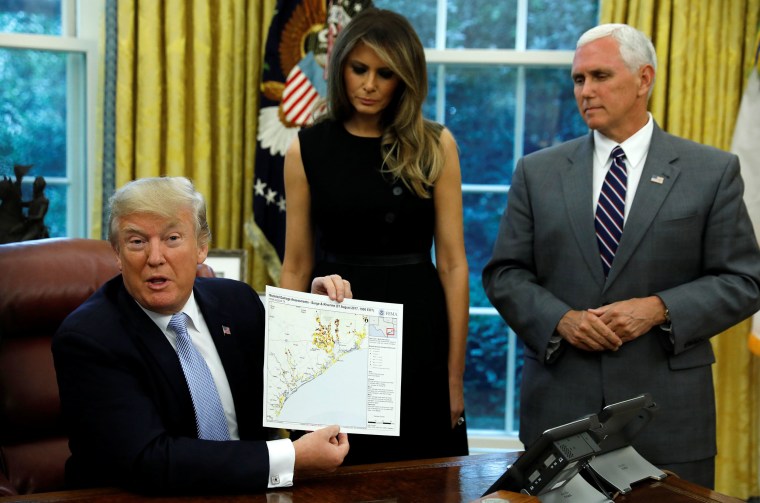WASHINGTON — Congress returns to Washington on Tuesday after five weeks away. While the big item on the Republican agenda for the fall is their push for tax reform, they have a long list of must-pass pieces of legislation to tackle, including providing aide to Texas and Louisiana for Hurricane Harvey, which will be the first major thing the House will vote on Wednesday.
And they have just 12 legislative days scheduled before a series of deadlines at the end of the fiscal year on Sept. 30, meaning much of the rest of their agenda is likely to be pushed back into November and December.
The devastation caused by Hurricane Harvey has added an urgent issue to the already crowded calendar, one that Republicans hope might spur some much-needed congressional cooperation that could extend to more difficult pieces of legislation.
The administration has asked for $7.85 billion for Harvey relief efforts, and Republicans predict that it could facilitate agreement on spending bills, the debt ceiling and other legislation traditionally opposed by Republicans to help those affected by the storm.
Rep. Mark Walker, R-N.C., head of the conservative Republican Study Committee, said helping victims would likely soften opposition to government spending from Republicans to enable adequate relief.
"To act like life goes on would be remiss and misleading on my part," Walker said of Harvey. "That's going to influence some of the decision-making."
Here are the bigger and more immediate matters Congress will be tackling as it hits the ground running:
Disaster relief
The administration has requested $7.85 billion for Harvey disaster relief. Most of it is for the Federal Emergency Management Agency's disaster relief fund, and the remaining $450 million is for the Small Business Administration's disaster loan program to help small businesses get back on their feet. This is the first thing the House is expected to vote on, and the vote will take place on Wednesday. Because it is expected to be a bipartisan piece of legislation, the controversial must-pass debt ceiling legislation could be added to it at some point along the process, which is what the Trump administration would prefer.
Debt ceiling
The Treasury's borrowing authority is set to run out next month, forcing Congress to lift the debt ceiling. By doing so, the Treasury can pay its obligations, including Medicare payments, operations for national parks and obligations to Border Patrol agents. Conservative Republicans, traditionally opposed to lifting the debt limit, are demanding that it be paired with mandatory spending reforms to reduce the size of the government. Congressional leadership has indicated that it would prefer a so-called clean debt limit, meaning no strings attached. But leaders may try to attach it to disaster relief to ensure that it goes through, because members are likely reluctant to vote against disaster relief.
Government spending
Congress is supposed to fund the 12 appropriations bills by the end of September, when the 2018 fiscal year begins. The House has already passed four appropriations and is expected to pass the remaining eight when it returns. The Senate, however, hasn't passed any and is going to pass a short-term continuing resolution to fund the government at current levels until December, giving Congress more time to work on the year's spending.
Flood insurance reauthorization
The national flood insurance legislation expires on Sept. 30, but it is in the spotlight now that Harvey has dumped 1 trillion gallons of water into the country's fourth-largest city and its environs. The payments from the last major floods, including hurricanes Sandy and Katrina, however, have left the program $25 billion in debt. Expect to see vigorous debate, as some Republicans think the flood insurance program is a national bailout and want to see it reformed.
SCHIP reauthorization
The Children's Health Insurance Program, which provides health insurance to low-income children, is traditionally a popular piece of legislation that is passed with bipartisan support. With its expiration quickly approaching, its main co-author, Sen. Orrin Hatch, R-Utah, would like to ensure that it maintains its bipartisan support. But after Republicans' failure to pass health care reform, SCHIP (the "S" is for "State," which used to be part of its name) could become more contentious if Republicans try to strip down Obamacare.
FAA reauthorization
This bill, which also needs to be extended by Sept. 30, governs the country's air traffic control system and determines passenger fees for air travel. President Donald Trump's proposed privatizing of the air traffic control system is included in the House-passed version of the bill. The Senate version, however, wouldn't privatize the system, and now the two bills must be reconciled.
Federal budget
It's not required for Congress to pass a budget, but Republicans want to because it would be the vehicle to move tax reform. Republicans could then use a tactic called budget reconciliation, which allows legislation to pass the Senate with only 51 votes, instead of 60.
Tax reform
While Congress has to pass the litany of above-mentioned bills, tax reform is the one it wants to pass. It would be a much-needed win for Republicans heading into the 2018 midterm elections, especially after the party's inability to repeal the Affordable Care Act.
But tax reform, which is complex legislation, is moving more slowly than originally advertised. Cathy Koch, a tax partner at Ernst & Young and the former tax counsel for the Senate Finance Committee, said the jam-packed fall agenda will be a guide to how difficult tax reform is.
"If it goes smoothly and the Republicans unite, tax reform will go more smoothly," Koch said.

